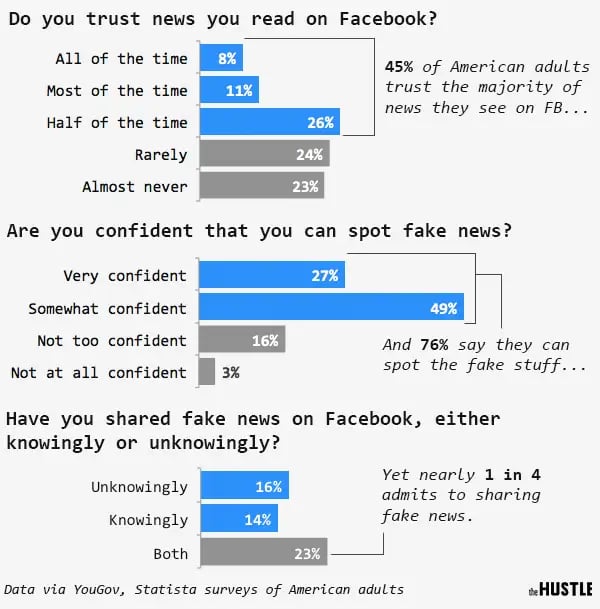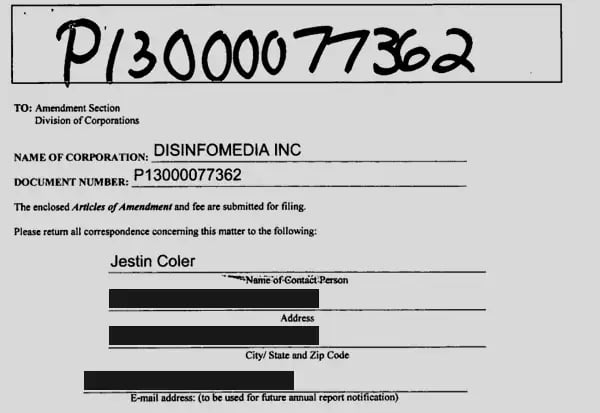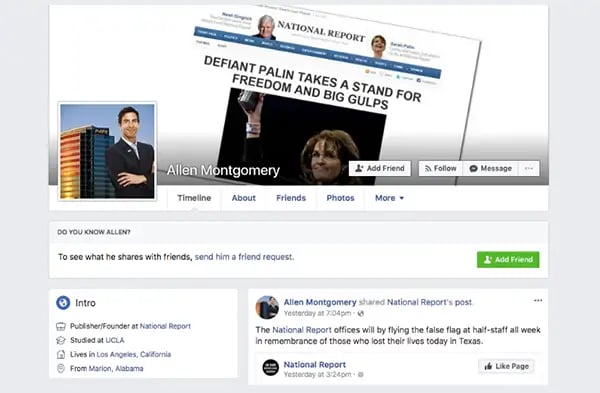Jestin Coler seems like your run-of-the-mill middle-aged guy.

The 42-year-old lives on a quiet street in a Los Angeles suburb with his wife and two kids. He likes sports and beer. Every morning, he pulls on a freshly pressed button-up and drives a minivan to his desk job at a software company.
But Coler has a dark secret: During the 2016 election, he was the “King of Fake News.”
For years, he ran one of the largest misinformation operations on the internet — a network of sites that generated 100m+ views per year with headlines like “Colorado Pot Shop to Provide Free Marijuana to Syrian Refugees” and “City in Michigan First to Fully Implement Sharia Law.” Enabled by the Wild West of Facebook, he raked in more than $30k per month.
What drove an unassuming suburban dad to be the Rupert Murdoch of fake news?
The origins of a “Fake News King”
Coler grew up in a small town in Northeastern Indiana — a blue-collar enclave where respect was earned through honesty and hard-work. His father (a life-long government employee), and mother (a paralegal) worked hard to instill these virtues in their son.
“There wasn’t a lot going on up there, and you took what you could get to make money,” says Coler. As a teen, he found work at family diners and factories.

In college, he fell in love with political science — particularly how public opinion could be shaped and swayed through media. He found brilliance in everything from WWII-era propaganda to the moralist undertones of Theodor Geisel (Dr. Suess) books, and became an active contributor to satire forums on the internet.
“I realized that satire was a tool,” he says, “and that it could change people’s minds.”
After graduating, he took a series of oddball media jobs — including an unlikely stint as the editor of International Yachtsman magazine — before eventually landing a role at a company that produces software for the publishing industry.
He got married, settled down in the suburbs, and had two kids. And for nearly a decade, he lived an average, quaint American life.
Then, he says, “I basically became a commercialized troll.”
A registered Democrat goes rogue
Around 2013, Coler began to notice that his Facebook feed was increasingly clogged with fake articles — and people were sharing them as reputable news.
“These sites would take a kernel of truth and twist it into a completely fake story to get people all worked up,” he says, “I got really interested in that, and spent time studying it… Ultimately, I decided I wanted to be a part of it as well.”
Coler, a registered Democrat with a distaste for “alt-right politics,” claims he was merely curious at the time, driven by a desire to understand the inner workings and psychology of mass media.
On a whim, he bought NationalReport.net — a domain that “sounded official” — and threw together a website.

He recruited some of his buddies from an old satire forum and gave them free reign to write for the site. They worked for free and adhered only to one core mission: Convince people of the most ridiculous, outlandish things possible.
The site had no marketing budget.
Coler would write up a story — say, “Muslim Bakery Refuses to Make American Flag Cake for Returning War Veteran” — spend as little as $10 on Facebook ads, and “spam it around” to 50 social groups (like anti-immigrant fan clubs) in a coordinated effort to stir the pot. The content, he hoped, would feed into readers’ pre-existing beliefs and biases.
“Nobody wants vegetables with their meal anymore,” he tells me. “Everyone just wants the red meat. Fake news is the red meat. You just give them what they want.”
It worked — and soon, the advertisers came knocking.
“This was not an honorable group of people”
“A few days in, I remember showing my wife Google Analytics and saying ‘Wow! Look, there’s ONE person on my site!’” recalls Coler. “Six months in, it was up to 400 or 500 concurrent visitors at any given time.”
As he expanded his staff, Coler enticed writers with a tantalizing proposition.
Each story had five ads: Banner ads above and below the story, and 3 smaller ads interspersed throughout the text. Money earned on the banner ads went to Coler — but he allowed writers to create their own independent Google AdSense accounts and collect 100% of the revenue from the in-text ads on their pieces.
This incentivized writers to produce increasingly more outlandish stories:
- “Hillary Clinton Promises to Confiscate ‘Three Times As Many’ Guns as Obama Did”
- “White House Plans To Recruit Illegals To Guard Nation’s Border!”
- “Facebook Confederate Flag Ban Anticipated”
- “Sylvester Stallone to Employ ISIS Militants for New Rambo Film?”
- “President Obama Advocates Eating Dogs In July 4th Address”
“This was not a very honorable group of people,” Coler says of his staff, which eventually grew to 25 writers.
A small disclaimer buried on his homepage — “All news articles contained within National Report are fiction, and presumably fake news” — made Coler’s operation legal, though most people who clicked on stories never realized what they were reading was fake.

By 2014, Coler had registered more than 25 other fake news sites, and was dishing out content to his sizeable social media following. To house his growing empire, he registered a business called DisInfoMedia, Inc.
That year, National Report raked in nearly 100m views, and it proved to be a lucrative operation for everyone involved. “I never thought anyone would believe that shit,” he says. “But turned out, gullibility was a goldmine.”
The misinformation money machine
Though Coler didn’t give me specific figures, he says “it wouldn’t be unreasonable” to surmise he was pulling in “mid-6 figures” per year from his fake news business. During some stretches, he says he personally pocketed as much as $30k per month.
This wealth was also enjoyed by the writers.
Many of Coler’s “top performers” — guys with “respectable day jobs” who moonlit as fake news purveyors — pulled in over $100k per year. One of his “star” writers, Paul Horner (who has since deceased) claims to have made $10k in a matter of minutes, after publishing a story claiming he was the elusive street artist Banksy.

But Coler soon hit a roadblock. Under mounting pressure over its inaction on fake news, Facebook implemented a new algorithm that aimed to clearly ID fake stories on the platform. For the first time, National Report’s stories were publicly marked as hoaxes on the platform.
So he changed his game plan: He set out to “trick Facebook into believing [he] was legitimate” by further blurring the lines of truth and fiction.
He registered the domain name “DenverGuardian.com” (a site that “could’ve easily been believable”) and loaded it up with real local news stories about sports teams, construction projects, and town hall meetings.
Then, he covertly began to sneak in major fake news stories with national appeal.
The story that broke the camel’s back
On November 5, 2016 — two days before the general election — Denver Guardian ran the following fake headline: “FBI AGENT SUSPECTED IN HILLARY EMAIL LEAKS FOUND DEAD IN APPARENT MURDER-SUICIDE.”
When it hit Facebook, it spread like wildfire, at one point generating 100 shares per minute. And for millions of readers, it played into preexisting distrust of Hillary Clinton.

For nearly 3 years, Coler had been operating under a veil of anonymity.
He created an alter-ego — Allen Montgomery — complete with fake photos, a biography, and an official title as publisher and owner of National Report. When members of the press reached out for comment, he’d correspond under this pseudonym, obscuring the details of his shady empire. After all, to his co-workers and most of his friends, he was still just a soft-spoken dad who drove a minivan.
But in the wake of the Clinton story, reporters started digging. And by the end of November, Laura Sydell, of NPR, managed to track down him down and expose him to the world.
The end, my friend
After he was outed, Coler decided to shut down all of his sites, save for National Report, which he’s since pivoted into a “more traditional” satire site. Today, its offerings include outdated posts like, “Chris Christie Elected to the Supreme Food Court.”
Once “America’s #1 independent news team,” his site’s slogan now reads, “America’s lousiest independent news source.”
In the aftermath, Coler says he became a “scapegoat for the entire outcome” of the election — a criticism he dismisses. “If a guy like me can actually influence the election from a couch,” he says, “then elections are fucked.”
When his name began surfacing on blogs and national websites, he received his comeuppance.
“I had death threats,” he says. “People showed up at my door, threatening me and my family. They literally wanted to kill me… people are crazy.” He’s since changed his phone number and moved to another house.

To this day, he still works his desk job at a software company. On the side, he gives talks about “restoring trust in media and all that bullshit.” He’s also working on a children’s book with his daughter.
“I do have regrets,” he cedes, in the final minutes of our phone call, “but people do worse things for money. I didn’t do anything illegal. I just pissed off some liberals…
“Look, I live in a very affluent part of the country, and buying a house was always unattainable. Not anymore. It afforded a better life for me and my family.”
He seems to classify himself as more of an opportunist than a villain (“I am known by many people as many things, but above all I am a father, a husband, a son, a brother, and by all means, a hard-working, middle-class American,” he writes on his personal website) — and ultimately, he places the blame on the people who clicked on his stories.
“We’ve all picked our sides, and we’re not even willing to listen to the other side,” he says. “I can’t be held accountable for that; I just shined a light on a problem that already existed.”
Often, at an event or talk, Coler will be confronted with the question on everyone’s mind: How does he sleep at night knowing that he profited off of duping the public?
“Fuck those people,” he says. “I sleep just fine.”
